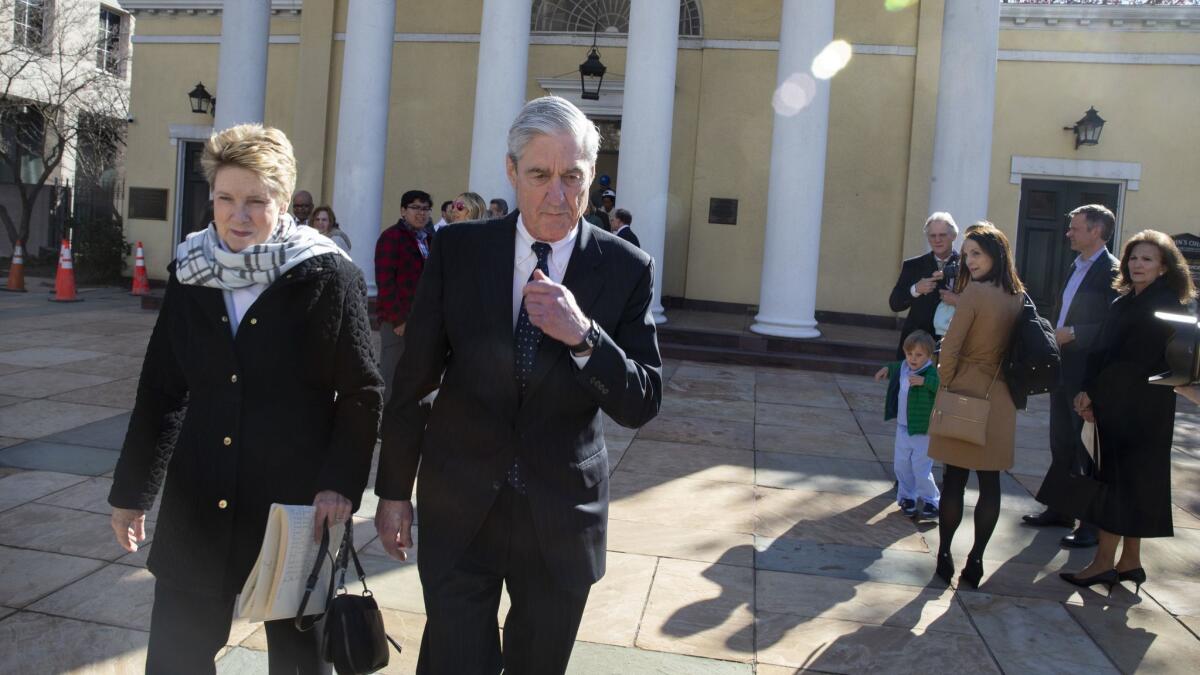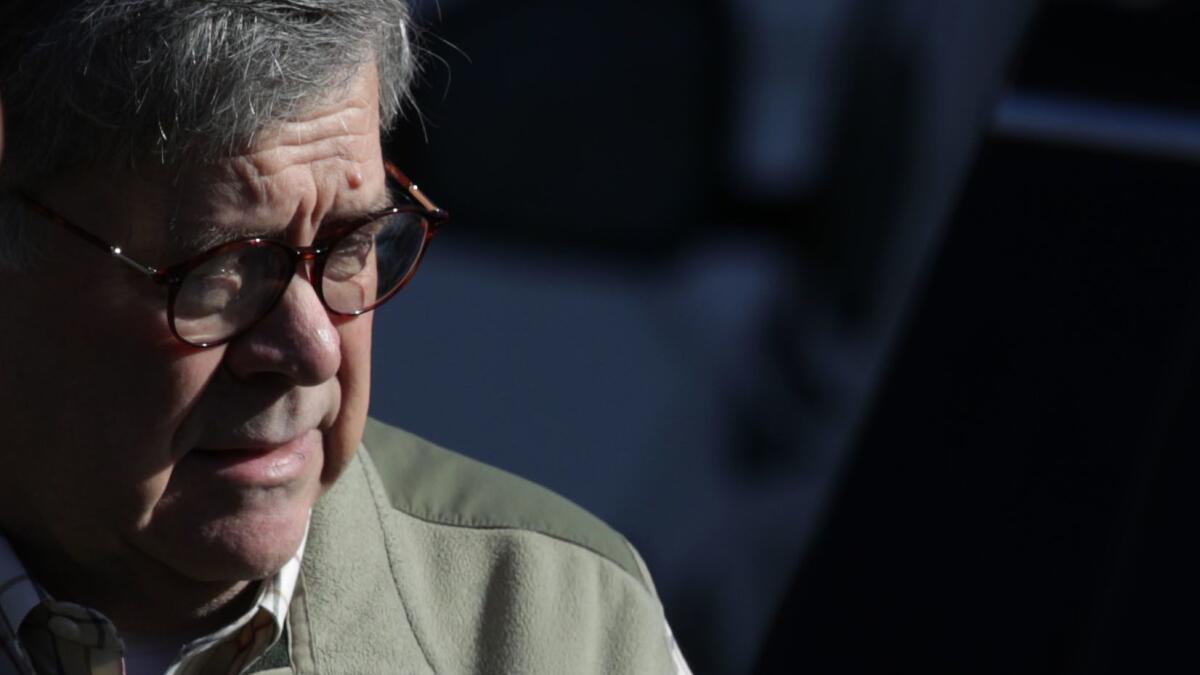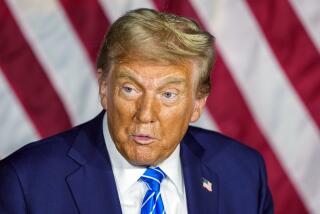Mueller finds no Trump-Russia conspiracy but doesn’t ‘exonerate’ Trump on obstruction, attorney general says

Reporting from Washington — Atty. Gen. William P. Barr told Congress on Sunday that special counsel Robert S. Mueller III did not find evidence that President Trump or his campaign conspired with Russians during the 2016 election, a significant victory for a president who has steadfastly denied any inappropriate ties to Moscow.
Mueller did not determine whether Trump obstructed justice, which was another focus of the investigation, yet he concluded that the evidence “does not exonerate” the president, Barr wrote in his letter to lawmakers.
The attorney general, however, decided the facts don’t show Trump committed a crime by trying to interfere with the Russia probe, a judgment that Democrats will fiercely contest and that will fuel their efforts to see Mueller’s full report.
Barr’s four-page letter was based on a final report from Mueller that remains confidential after being submitted to the Justice Department on Friday.
Read Atty. Gen. William P. Barr’s summary of the Mueller investigation »
“It was a complete and total exoneration,” Trump told reporters before boarding Air Force One to fly back to Washington from Florida, where he spent the weekend at his Mar-a-Lago resort. “It was a shame that our country had to go through this.”
He angrily described the investigation as “an illegal takedown that failed.”
Barr’s letter does nothing to wipe away the numerous crimes to which Trump’s associates have confessed during the nearly two-year investigation, nor does it deter other ongoing probes — some of them referred to federal prosecutors by the Mueller team — that threaten the president and his businesses.
But it does provide Trump with some inoculation against allegations from Democrats and other critics who have ascribed dark motivations to Trump’s praise for Russian President Vladimir Putin and his dismissals of Moscow’s covert operation.
However, unlike the president, Barr accepted as fact the Mueller team’s evidence that Russians interfered in the 2016 election and that there were “multiple offers from Russian-affiliated individuals to assist the Trump campaign” — a conclusion that contradicted Trump’s acceptance of Putin’s denial at their Helsinki summit last year.

Mueller’s conclusions could blunt House Democrats’ own investigations of the president now getting underway, with some covering the same ground that the special counsel has scoured. The findings also do not provide a clear case to impeach the president that some party activists had hoped for, to overcome Democratic leaders’ opposition to such action.
Yet Democrats in Congress are likely to be energized in their efforts to force disclosure of Mueller’s entire report, especially given that Barr quoted only sparsely from it.
In particular, his letter is certain to spark a renewed debate over whether the president obstructed justice, especially given Barr’s finding that Trump did not do so after Mueller declined to decide the question.
The attorney general wrote that Mueller simply outlined evidence for and against an obstruction case. Barr quoted from the special counsel’s submission: “While this report does not conclude that the President committed a crime, it also does not exonerate him.”
Barr reviewed Mueller’s findings over the weekend with Deputy Atty. Gen. Rod Rosenstein, who appointed Mueller and supervised the investigation. They determined, he said, that there is not sufficient evidence “to establish that the President committed an obstruction-of-justice offense.”
One factor that weighed heavily, Barr wrote, was that there was no proof the president was involved in an underlying crime involving the election and Russian interference. Such a circumstance, he said, would make it hard to win a conviction for obstruction, even setting aside Justice Department rules against indicting a sitting president.
“In cataloguing the President’s actions, many of which took place in public view, the report identifies no actions that, in our judgement, constitute obstructive conduct,” Barr wrote.
Democrats are unlikely to accept that conclusion from Barr, a Trump appointee who criticized the investigation into obstruction of justice before his nomination as attorney general, and especially after Trump repeatedly expressed a desire to shut down what he described as a “witch hunt.”
Rep. Jerrold Nadler of New York, the Democratic chairman of the House Judiciary Committee, said he plans to call Barr to testify “in the near future” about the “very concerning discrepancies” between his letter and Mueller’s report.
The hearing would be another step in what could become a prolonged tug of war over fully disclosing the special counsel’s findings. House Democrats have talked about issuing subpoenas or bringing Mueller himself to Capitol Hill to answer questions.
Congress’ Democratic leaders, House Speaker Nancy Pelosi of San Francisco and Senate Minority Leader Charles E. Schumer of New York, said in a joint statement that Barr’s letter “raises as many questions as it answers.” They said the attorney general “is not a neutral observer and is not in a position to make objective determinations.”
Their statement did not address the conclusion that there was no conspiracy with Russia, a finding that Trump and his allies described as a clear vindication of the president and his campaign.
“This case is closed,” said Rep. Kevin McCarthy of Bakersfield, the Republican minority leader in the House.
He added, “Democrat leaders acted irresponsibly and threw caution to the wind to damage and distract from the work the Trump administration is doing on behalf of our fellow citizens.”
Trump, like members of Congress, was unaware until Sunday afternoon of the contents of the report Mueller sent to the Justice Department on Friday. The attorney general’s chief of staff called Trump lawyer Emmet Flood to provide him with a summary of Barr’s letter at about 3 p.m., a senior Justice Department official said.
The letter provided new details on the breadth of the Russia investigation. Mueller’s office included 19 lawyers who were assisted by 40 FBI agents, analysts, forensic accountants and other specialists. The special counsel also issued more than 2,800 subpoenas, executed nearly 500 search warrants and interviewed roughly 500 witnesses.
One of those interviews, however, was not with the president. Trump only answered written questions from the special counsel’s office, and Mueller never issued a subpoena for an interview, thus avoiding a possible legal fight that could have gone to the Supreme Court.
Barr said more information from the investigation could be forthcoming, and he has promised to provide “as much transparency as possible.” He wrote that he plans to work with Mueller to determine what else can become public while withholding information from secret grand jury testimony or ongoing investigations.
Mueller is not seeking more indictments and is expected to step down as special counsel in the coming days, after nearly two years of assiduously behind-the-scenes investigating with his team. Rosenstein appointed Mueller, a former FBI director to two presidents, after Trump fired his successor at the FBI, James B. Comey, in May 2017 — a firing that became part of the obstruction investigation.
Along the way, a total of 34 people were charged, including 25 Russians and several of the president’s close associates. Some of the Russians charged were accused of spreading disinformation on social media, while others were charged with hacking Democratic Party emails and releasing them through WikiLeaks at key moments to undermine Trump’s 2016 rival, Hillary Clinton.
No Americans have been charged with working with Russians during the campaign. However, Mueller helped expose an eagerness by Trump and his associates to capitalize on Moscow’s assistance, then lie about it repeatedly.
Michael Cohen, Trump’s former lawyer, admitted to seeking help from the Kremlin to build a luxury skyscraper in Moscow that would have earned Trump hundreds of millions of dollars. The negotiations were underway until after Trump secured the Republican presidential nomination, far longer than Cohen had originally testified to Congress. He is scheduled to start a three-year prison sentence May 6.
Michael Flynn, Trump’s first national security advisor, pleaded guilty to lying about discussing sanctions with the Russian ambassador during the presidential transition period.
Roger Stone, a longtime political advisor to Trump, was indicted in January in connection with lying about his pursuit of Democrats’ hacked emails from WikiLeaks. He has pleaded not guilty and he is scheduled to stand trial later this year.
In addition, Donald Trump Jr. accepted a meeting with a Russian lawyer during the campaign after being told she represented the Kremlin’s support for his father. “I love it,” Trump Jr. wrote to an intermediary, and he hosted the lawyer at Trump Tower along with Jared Kushner, his brother-in-law and a top campaign advisor, and Paul Manafort, the campaign chairman.
No charges have been filed in connection with the Trump Tower meeting in June 2016, and participants have said that no campaign assistance was provided during the encounter.
Manafort was convicted of financial crimes connected to his work as a political consultant to what was then the pro-Russia government in Ukraine, and he also pleaded guilty to two conspiracy charges related to attempted witness tampering and an illegal lobbying scheme. He has been sentenced to 7½ years in prison.
Mueller’s work has also spawned a series of other investigations, notably in New York, where Cohen admitted his role in a hush money scheme that silenced two women who claimed they had affairs with Trump. Federal prosecutors in the Southern District of New York, which is handling the case, said Trump directed the scheme during the campaign, directly implicating the president in a felony.
There are also ongoing investigations into Trump’s inaugural committee, his now-defunct charitable foundation and his businesses.
In a recent Fox News interview, the president said, “I don’t know about these things.”
“I said to my lawyers, ‘Are we being looked at here, there?’ ” Trump said. “They don’t even know what people are talking about.”
Times staff writer Laura King contributed to this report.
More to Read
Get the L.A. Times Politics newsletter
Deeply reported insights into legislation, politics and policy from Sacramento, Washington and beyond. In your inbox three times per week.
You may occasionally receive promotional content from the Los Angeles Times.












